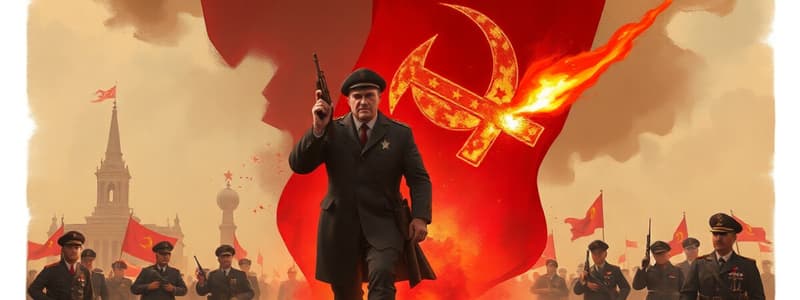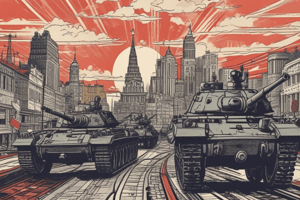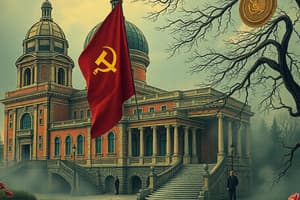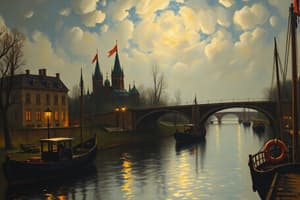Podcast
Questions and Answers
Before World War II ended, which alliance began to show signs of strain?
Before World War II ended, which alliance began to show signs of strain?
- The alliance between the United States and the Soviet Union. (correct)
- The alliance between Great Britain and France.
- The alliance between Italy and Austria-Hungary.
- The alliance between Germany and Japan.
What did President Roosevelt hope would result from victory over the Axis powers?
What did President Roosevelt hope would result from victory over the Axis powers?
- Territorial expansion for the Allied nations.
- A more peaceful world through the United Nations. (correct)
- The collapse of capitalism.
- A more powerful United States.
After World War II, the relationship between the United States and the Soviet Union can be described as what?
After World War II, the relationship between the United States and the Soviet Union can be described as what?
- Becoming isolationist.
- Remaining neutral.
- Increasingly cooperative.
- Increasingly hostile. (correct)
What was a primary security concern for the Soviets after World War II?
What was a primary security concern for the Soviets after World War II?
How many times had Germany invaded Russia in less than 30 years?
How many times had Germany invaded Russia in less than 30 years?
Soviet leaders believed that communism was what?
Soviet leaders believed that communism was what?
Soviet leaders were suspicious of what type of nations?
Soviet leaders were suspicious of what type of nations?
American leaders thought which event had caused World War II?
American leaders thought which event had caused World War II?
What did American leaders believe was key to world peace?
What did American leaders believe was key to world peace?
Where did Roosevelt, Churchill, and Stalin meet in February 1945 to discuss postwar plans?
Where did Roosevelt, Churchill, and Stalin meet in February 1945 to discuss postwar plans?
At Yalta, Stalin reaffirmed what pledge?
At Yalta, Stalin reaffirmed what pledge?
What was the first issue the leaders discussed at Yalta?
What was the first issue the leaders discussed at Yalta?
After the Soviets liberated Poland, what type of government did they encourage?
After the Soviets liberated Poland, what type of government did they encourage?
What did Churchill say Poland should be?
What did Churchill say Poland should be?
According to Stalin, the Polish government had to be friendly to which country?
According to Stalin, the Polish government had to be friendly to which country?
The Declaration of Liberated Europe asserted what right?
The Declaration of Liberated Europe asserted what right?
Which countries would control zones of Germany after the war?
Which countries would control zones of Germany after the war?
Stalin wanted Germany to pay what for the war damage it caused?
Stalin wanted Germany to pay what for the war damage it caused?
Arguments about reparations and economic policy in Germany did what?
Arguments about reparations and economic policy in Germany did what?
What did the Soviets pressure the King of Romania to do two weeks after Yalta?
What did the Soviets pressure the King of Romania to do two weeks after Yalta?
The United States accused the Soviets of violating what?
The United States accused the Soviets of violating what?
Truman believed World War II had begun because of Britain's attempt to?
Truman believed World War II had begun because of Britain's attempt to?
At Potsdam, Truman was convinced that what was critical?
At Potsdam, Truman was convinced that what was critical?
At Potsdam, Stalin and his advisors were convinced that they needed what from Germany?
At Potsdam, Stalin and his advisors were convinced that they needed what from Germany?
What name came to be used for the Communist countries of Eastern Europe?
What name came to be used for the Communist countries of Eastern Europe?
Flashcards
Clash of Interests
Clash of Interests
Even before World War II ended, the wartime alliance between the United States and the Soviet Union had begun to show signs of strain.
Post-war Tensions
Post-war Tensions
Tensions increased between the US and Soviet Union because they had different goals after World War II.
Soviet Security Concerns
Soviet Security Concerns
The Soviets wanted to keep Germany weak and ensure control over countries between Germany and the Soviet Union due to security concerns.
Soviet Ideology
Soviet Ideology
Signup and view all the flashcards
American Economic Concerns
American Economic Concerns
Signup and view all the flashcards
Economic Growth and Peace
Economic Growth and Peace
Signup and view all the flashcards
Yalta Conference
Yalta Conference
Signup and view all the flashcards
Poland's Post-War Government
Poland's Post-War Government
Signup and view all the flashcards
Churchill's View on Poland
Churchill's View on Poland
Signup and view all the flashcards
Stalin's View on Poland
Stalin's View on Poland
Signup and view all the flashcards
Declaration of Liberated Europe
Declaration of Liberated Europe
Signup and view all the flashcards
Divided Germany
Divided Germany
Signup and view all the flashcards
German Reparations
German Reparations
Signup and view all the flashcards
Tensions over Germany
Tensions over Germany
Signup and view all the flashcards
Soviet Actions in Romania
Soviet Actions in Romania
Signup and view all the flashcards
Violation Accusations
Violation Accusations
Signup and view all the flashcards
Limited Polish Representation
Limited Polish Representation
Signup and view all the flashcards
No More Appeasement
No More Appeasement
Signup and view all the flashcards
Truman's View on Germany
Truman's View on Germany
Signup and view all the flashcards
Stalin's View on Reparations
Stalin's View on Reparations
Signup and view all the flashcards
Reparations Dependence
Reparations Dependence
Signup and view all the flashcards
Satellite Nations
Satellite Nations
Signup and view all the flashcards
Study Notes
A Clash of Interests
- Even before World War II finished, signs of strain appeared in the wartime alliance between the US and the Soviet Union.
- President Roosevelt hoped victory over the Axis and the UN's creation would foster a more peaceful world.
- Instead, the US and the Soviet Union grew increasingly hostile after the war.
Soviet Security Concerns
- The Soviets aimed to keep Germany weak and control the countries between Germany and the Soviet Union.
- Tensions rose between the US and the Soviet Union because of differing goals.
- Soviet leaders were concerned about security as Germany had invaded Russia twice in under 30 years.
- Soviet leaders were communists
- They considered communism a superior economic system that would replace capitalism, and that the Soviet Union should promote communism internationally.
- Soviet leaders were suspicious of capitalist nations, seeing the possibility of capitalist countries attempting to destroy communism
American Economic Concerns
- American leaders focused on economic problems, while Soviet leaders focused on securing borders.
- Numerous American officials thought the Depression had caused World War II.
- Hitler would not have risen to power, and Japan would not have expanded its empire without it.
- When nations seal themselves off economically, they must go to war to get resources.
- By 1945, President Roosevelt and his advisers believed economic growth was crucial for world peace.
- They sought to foster economic growth by increasing world trade.
- American leaders thought democratic governments protecting people's rights made countries more stable and peaceful.
- The free enterprise system was considered the best path to prosperity.
The Yalta Conference
- In February 1945, Allied leaders Roosevelt, Churchill, and Stalin met in Yalta to plan the postwar world.
- Stalin reaffirmed the Soviet pledge to enter the war against Japan after Germany's defeat.
- Agreements reached at Yalta later played a significant role in causing the Cold War.
Poland
- Polish government leaders fled to Britain after the German invasion.
- In 1944, Soviet troops drove back the Germans and entered Poland.
- Discussions at Yalta focused on Poland's future.
- As the Soviets liberated Poland from German control, they encouraged Polish Communists to form a new government.
- This resulted in two governments claiming the right to govern Poland: one Communist and one non-Communist.
- Churchill said that Poland should be free and sovereign
- Roosevelt and Churchill argued that Poles should freely choose their government and not have one imposed on them.
- Stalin said the Polish government had to be friendly to the Soviet Union and that it was "a matter of life and death."
- Roosevelt and Churchill agreed to recognize the Soviet-established Polish government, and Stalin agreed to include members of the prewar Polish government and hold free elections soon.
- After reaching a compromise on Poland, Roosevelt, Churchill, and Stalin agreed to issue the Declaration of Liberated Europe.
- The declaration stated “the right of all people to choose the form of government under which they will live.”
- They would be allowed "to create democratic institutions of their own choice”
- They promised to create temporary governments that represented "all democratic elements”
- They agreed "the earliest possible establishment through free elections of governments responsive to the will of the people."
Dividing Germany
- Great Britain, the US, the Soviet Union, and France would each control one zone.
- The same four countries would also divide Berlin, despite being in the Soviet zone.
- After agreeing on liberating Europe, the conference centered on Germany and divided it into four zones.
- Stalin wanted to weaken Germany economically, despite being pleased with the decision to divide Germany.
- Stalin demanded heavy reparations from Germany for war damage.
- Roosevelt agreed, but insisted reparations be based on Germany's ability to pay.
- Stalin agreed to Germany paying reparations with trade goods and products instead of cash.
- The Allies could remove industrial machinery, railroad cars, and other equipment from Germany as reparations.
- Arguments about reparations and economic policy in Germany increased tension between the US and the Soviet Union, becoming a major cause of the Cold War.
Tensions Begin to Rise
- Two weeks after Yalta, the Soviets pressured the King of Romania into appointing a Communist government.
- The Yalta decisions shaped US expectations.
- The US accused the Soviets of violating the Declaration of Liberated Europe.
- The Soviets refused to allow more than three non-Communist Poles in the 18-member Polish government soon after this.
- There was no indication of planning free elections in Poland as promised.
- President Roosevelt informed the Soviets on April 1 that their actions in Poland were unacceptable.
- President Roosevelt died eleven days later, as Soviet-American relations declined, and Vice President Harry Truman took office.
Truman Takes Control
- The Allies defeated Germany and Japan in World War II.
- The beginnings of the Cold War will be examined here.
Not Making the Same Mistake
- Truman believed World War II started because Britain appeased Hitler.
- He was determined not to make the same mistake with Stalin.
- Truman was strongly anticommunist and suspicious of Stalin.
- During a meeting with Soviet Foreign Minister Molotov, Truman raised Poland and demanded Stalin keep his promise for free elections at Yalta.
- Molotov delivered the unexpectedly strong message back to Stalin.
Truman Concern
- Truman and Stalin met at Potsdam near Berlin to work out a deal on Germany.
- By July 1945, war against Japan was still ongoing.
- Truman believed a revived German economy was vital for Europe's recovery and to prevent Germans from turning to communism out of desperation.
Stalin Concern
- Stalin and his advisors believed they needed reparations from Germany because the war had devastated their economy.
- Soviet troops began stripping machinery and industrial equipment from Germany to use back home, but Stalin wanted Germany to pay more.
- There was much arguing over Germany; Soviets wanted more money by taking from the Germans, while the US wanted Germans to recover because it was essential to Europe.
Potsdam Conference
- Germany occupied much of northern France and its Atlantic coastline.
- Germany installed a puppet government in Vichy and appointed Marshal.
- Stalin disagreed with Truman's proposal.
- He had to accept the deal because of the possibility of the atomic bomb.
- American and British troops controlled Germany's industrial heartland, so the Soviets could only get reparations by cooperating.
- The Potsdam conference increased tensions between the Soviets and Americans, paving the way for the Cold War.
No More Compromise
- The Soviet army's presence in Eastern Europe ensured pro-Soviet Communist governments would be established in Poland, Romania, Bulgaria, Hungary, and Czechoslovakia.
- Although Truman won the argument over reparations, he had less success on other issues at Potsdam.
- The Soviets refused stronger commitments to uphold the Declaration of Liberated Europe.
Satellite Nations
- Eastern European Communist countries became known as satellite nations.
- They had to remain Communist and friendly to the Soviet Union, but were not under direct Soviet control.
- They had to follow policies approved by the Soviets.
Studying That Suits You
Use AI to generate personalized quizzes and flashcards to suit your learning preferences.




